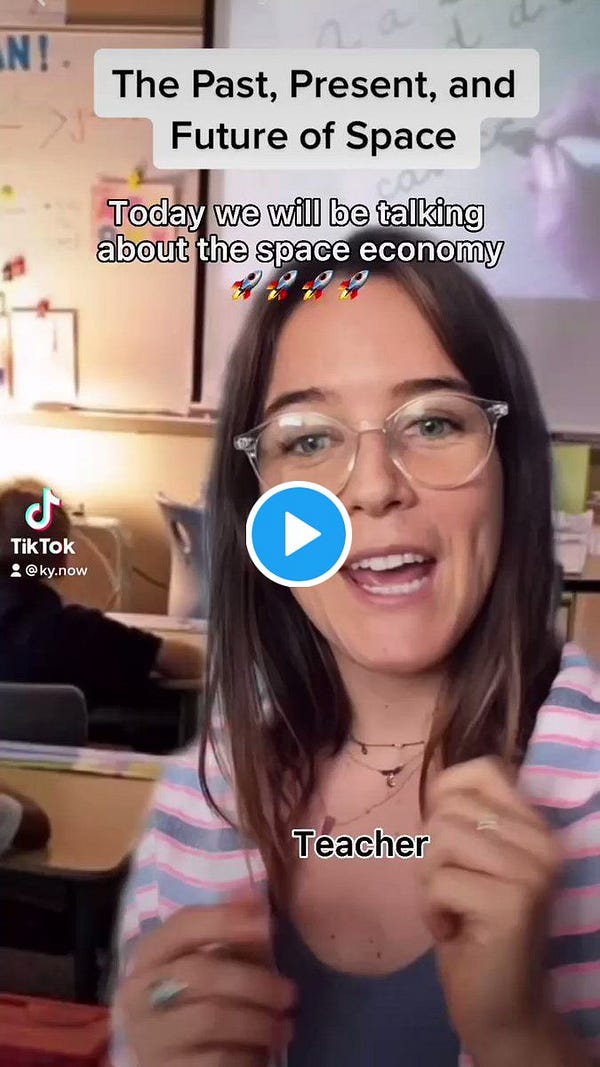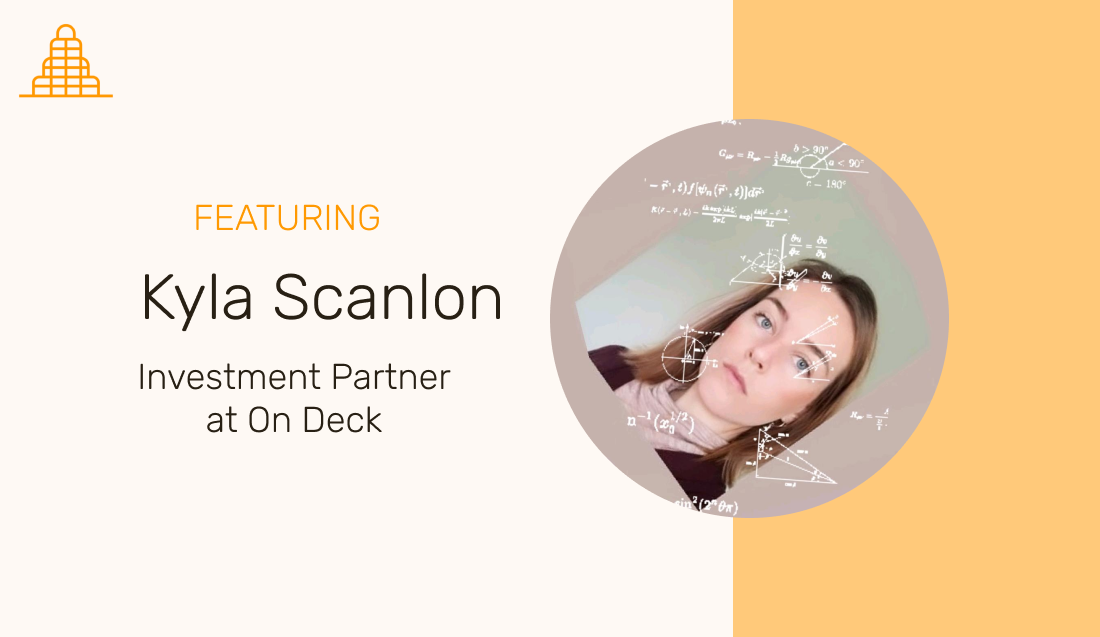👋 Welcome to the latest issue of The Jungle Gym – the newsletter that helps you build a more fulfilling career by integrating your work and life.
✨ If you’re a new reader, thanks for stopping by. Feel free to check out this introductory post, which explains what The Jungle Gym is all about.
🗝 This is my monthly issue of The Keyring, a format of this newsletter that features someone impressive identifying the tools, methods, and frameworks they’ve used to make progress in their careers.
📬 To get future issues delivered to your inbox, enter your email here:
Career success used to be a ladder-climbing game. Find a booming industry, work your way into a prestigious firm, then grind it out for a couple of decades until you reach the top. At some point, the ladders got crowded. Baby Boomers lingered in their perches, preventing younger workers from advancing. Realizing this game was no longer worth playing, many millennials and Gen-Zers have abandoned ladder-climbing in favor of building their own elevators.
Kyla Scanlon is a master elevator builder. After starting her blog at age 18, she has spent the past five years creating content. Six months ago, she left her job at an investment management firm to help run On Deck’s Investing Fellowship and pursue her goal of reshaping financial education. Meanwhile, she’s grown followings on TikTok and YouTube - and has partnered with influential business news brands like Morning Brew and Colossus.
While her content may seem light-hearted, there’s an incredible amount of research and craft behind it. That’s why I’m excited to introduce you all to the mind behind the memes.
In this issue of The Keyring, Kyla shares:
📹 Her process for making content
📈 How she stays on top of the markets
💰 The best ways to build financial literacy
🎨 What makes for a good meme
📚 The information sources she depends on
and plenty more…
How do you describe what you do?
I usually tell people that I work in tech and am a financial content creator. But, to get more specific, I work at On Deck, I invest, I make videos, I write research papers, all with the goal of providing free and accessible content to everyone. My ultimate plan is to reinvent how we think about financial education and media.
What made you start posting financial education videos on TikTok?
I’ve actually been doing this sort of thing for a long time! I started trading options when I was younger and developed a blog to chronicle my trading experience. But, I only started posting to TikTok in December 2020. I was pretty late to the game. Initially, I posted about science and other random stuff until I left my job in February 2021. That’s when I started posting financial content.
At first, the videos were mostly explainers (like this one about the Treasury National debt limit) but then I began to try out daily market updates. I was posting 1-2x a day on market happenings. Then I did a skit about Archegos, cross-posted it to Twitter, and that’s when I really was like “wow this is fun - and it’s helping people”.
How did you decide to abandon the conventional finance career path?
I have always been really passionate about financial education - and I have some very independent tendencies - that work really well in a startup environment, but not so much in an institutional environment. I wanted to build - and that meant leaving the industry.
What’s your process for making videos?
I have two types of videos that require a slightly different process:
Daily market updates: I just screenshot news articles and explain them. It’s sort of funny because the news is already so condensed and I am condensing it even more. But, people really seem to like it. I think the news can overcomplicate and induce fear, so decomplicating things is important.
Skits: These are where I get weird. I usually get an idea, and then I think “what if crypto tried to apply to McDonald’s AND McDonald’s was a semiconductor distributor (no ice cream = no semiconductors).” Then I try to tie together all those thoughts into a script.
Idea: I see one thing. I try to connect it with others. I write the script throughout the day.
Film: I use costumes and facial expressions to their fullest potential
Edit: I do sharp cuts and voice fadeovers (I have no idea if that’s the technical term) so it moves super fast
What sources of information do you consume on a regular basis?
Twitter: When you need bite-size information, Twitter is the best place to get it.
Newsletters: Particularly for the investors and financial media people I follow.
10-Ks: I am a big nerd, and really love to read 10ks. I find it interesting to dive into how companies describe themselves - sometimes what they think is important isn’t what the market thinks is important, and understanding that discrepancy is powerful.
What’s the best way for someone to build their financial literacy?
Play the game. It's like learning how to ride a bike, you just have to do it. Here’s how to get started:
Figure out what you want to learn - do you want to learn options, single stock, index funds, crypto? Pick one type of investment and spend time only on that. So, if you wanted to learn all about single stocks:
What types of companies do you like? Figure out what type of thing you want to invest in - it can be as straightforward as investing in Apple because you have an iPhone. You could also choose to invest in ETFs - that will give you diversified exposure to different sectors/industries depending on what you are interested in.
Where to buy it? Pick a brokerage. Robinhood, Public, TD Ameritrade, etc - pick one (there aren’t many key differences) and transfer some money into it. From there, you can purchase the investment.
Play the game - don’t go crazy. Try to tabs on the companies/ETFs, etc that you have chosen.
Read - follow sharp investors on Twitter and subscribe to their newsletters. For the concepts that don’t make sense, search on Investopedia.
Watch - osmosis is one of the best ways to understand a new topic. Listen to podcasts, the news, and Financial YouTubers like me :) Just do your best to process what they are saying and look things up when you encounter words you don’t understand.
Patience - this stuff is like a whole different language and it honestly doesn’t make sense all of the time. Give yourself time to learn. Ask questions.
What makes for a good meme?
Something that is a little bit of an inside joke but also resonates on some aspects of public life. It needs to make sense and be funny to those who aren’t super into the markets but also have that fun financial spin. Most memes poke fun at something that recently happened, draw a circle of knowledge around it, and deliver it in a short form fashion. I think memes are so powerful - they are basically short-form narratives. I wrote a piece about it here.
Who are three people in your field whose work you admire, and why?
There are so many people that I am endlessly inspired by. These are just some names that inspire me both in my field and in my personal life.
Nick Maggiulli has been a DAY ONE supporter. He was following me when I had ~800 followers, supported my rideshare thesis (my first big public work), and has always been there for me. He has inspired me to discover my own path in the world, and his blog is a constant source of amazing information.
Colin and Samir are doing SO MUCH for the creator economy. It's been wonderful to see them grow. They are great a spotlighting underestimated creators (like Victoria Paris) and giving them room to share their stories.
Lisa and Tracy from Bloomberg continuously produce incredible content. They inspire me to be more vocal on the Internet - and have paved the path for the next generation of women investors. They write incredibly well and are so knowledgeable on a wide variety of topics.
What are three books or information sources that have made you better at what you do?
Commentary Youtubers like Cody Ko, Kurtis Conners, Drew Gooden, and Danny Gonzalez have taught me how to bring comedy to EVERYTHING. The ability to get people to enjoy listening to you talk about “random things” is super powerful.
Philosophize This is such an amazing podcast. It manages to breaks philosophy into manageable, accessible chunks. Also, the host, Stephen West, has an amazing backstory. I love his personal motto of knowing more than he did yesterday and limiting the suffering of others.
Graceling is a children’s novel that I read when I was in middle school. But I think most of my creativity comes from these books. I used to go to our local library every week with my mom (HUGE shoutout) and get a stack of ten books. And I would just tear into them - so I probably read ~3,600 books from the time I was 8 years old to when I was ~15 years old (then it started to drop).
Five Takeaways
Here are five insights you can take from Kyla to make progress in your own career:
To cultivate your financial education, start playing the game.
To learn something new, start playing the game then immerse yourself in information
There’s a lot of valuable information in the discrepancy between the stories that companies tell about themselves and the narratives shared by the markets
The best memes are short-form narratives
The ability to get people to enjoy listening to you talk about “random things” is super powerful.
A big thanks to Kyla for sharing her journey. If you want to check out more of Kyla’s content, follow her on Twitter and TikTok.
If you enjoyed this issue of the newsletter, I'd really appreciate it if you could forward it to a friend, family member, or colleague who you think might like it too.
Or, if you'd like to share it on one of your social networks, that’s always great as well.
Until next time,








